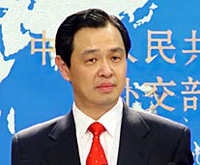 China Thursday said that it is "strongly displeased and firmly opposed'' to a visit to Taiwan by a Pentagon official to discuss anti-missile cooperation and US weapons sales to the island.
China Thursday said that it is "strongly displeased and firmly opposed'' to a visit to Taiwan by a Pentagon official to discuss anti-missile cooperation and US weapons sales to the island.
Foreign Ministry spokesman Kong Quan said in a press release the military exchanges and cooperation between the United States and Taiwan have violated the principles of past communiqués.
The US promised in a major communiqué, signed on August 17, 1982, that it would gradually reduce its arms sale to the island, leading to "a final resolution.''
Warning that this week's move will send the wrong signals to Taiwan, Kong urged the United States to clearly recognize the damage it could cause on such a sensitive issue.
The US should adhere to the promises it has made on the issue to avoid impairing its relations with China, said Kong.
It has been reported that a group of 10 officials from the United States led by Mary Tighe, chief in charge of Asia Pacific security affairs at the US Department of Defence, arrived in Taipei on Tuesday to evaluate Taiwan's defence capability.
The Foreign Ministry spokesman also said China opposed the passing of a bill by the US House of Representatives to support Taiwan's participation in the World Health Organization (WHO).
As a part of China, Taiwan is not qualified to join or assume observer status at the World Health Assembly because members of the global body are sovereign states, noted Kong.
The bill, passed on Tuesday, has violated the norms of international laws and the principles of the three Sino-US joint communiqués, he said.
Kong also said the bill interfered in China's internal affairs and said that it is doomed to failure.
Between 1997 and 2001, the WHA rejected five consecutive proposals for Taiwan to take part in it as an observer.
At a regular briefing Thursday, Kong said that an advance group from the United States has visited China to prepare for US Vice-President Dick Cheney's scheduled trip to China next month.
The group talked over matters of protocol for the visit, according to Kong.
Cheney's visit is one of a series of high-level visits between China and the United States in recent years. Both President Jiang Zemin and Vice-President Hu Jintao visited the United States last year and US President George W. Bush also visited China last February.
Turning to the Iraqi issue, Kong told the press that China is willing to contribute personnel and technological resources to United Nations (UN) weapons inspections in Iraq.
When asked to comment on Britain's new proposal on Iraq disarmament, Kong again stressed that Iraq should guarantee it is not in possession of weapons of mass destruction, and that the Iraqi issue should be resolved in political ways.
"We think the urgent task now is to continue with the weapons inspection, to strengthen it and to implement to the full the UN Security Resolution 1441,'' said Kong.
(China Daily March 14, 2003)
|

